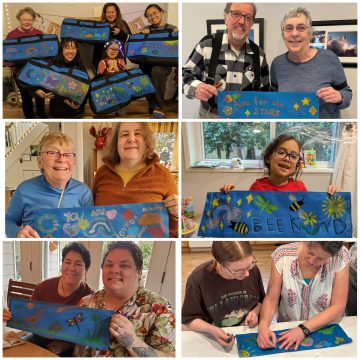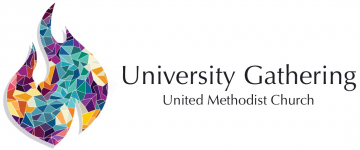News
Doing Church Differently

Happy Friday everyone!
Jemina here. This past Sunday we gathered once again to share a meal, discuss and create together. Jill and I are overjoyed by the time we spent together at brunch church and blessed to have the opportunity to share our home with others. Since joining this church, I have always believed in our ability to “do church differently” and this opportunity has truly shown our capacity to do so. At our own brunch church, we have opened up the table to children’s voices, given them a spotlight, and been blessed to have a peek into their creative minds. I am excited about the connections this different way of gathering will bring us and I am proud to be part of this community.
I also want to express my gratitude to all of you who participated in our Sweet Case activity. The unique designs that everyone created were beautiful displays of encouragement and love that will undoubtedly bring joy to foster children. It was heartwarming to see our community come together, brainstorm ideas, and decorate the bags with utmost care. I feel so blessed to be surrounded by such a compassionate and creative group of individuals. Let’s continue to keep the well-being of our foster children in mind and extend our support to them whenever possible.
With much gratitude,
Jemina MarasiganFamily and Community Engagement Minister
Unexpected Blessings

Kindred in Christ,
I have come to experience God in my life primarily through two modes—through the unexpected, and through other people. While planning predictable outcomes on my own can be helpful and needed, there is something about having to walk into the unknown and depend on others, which opens me up to new encounters with the Holy Spirit and holy community.
This season, after abruptly finding ourselves no longer able to host Sunday gatherings in the Masonic Lodge, we had to give up church as we know it for Lent. We were forced to walk into an unexpected wilderness. Yet, it is turning out to be a journey of greater creativity and community as we gather in people’s homes across the city for Brunch Church. As one of our members posted in our U Gathering Facebook Group this week, “I wanted to say I really enjoyed the ability to get to know people on a deeper level during the brunch church on Sunday! It was really nice having a meal and time to have longer conversations. I feel like this sudden space shake up has really been a blessing! I look forward to the next few weeks!” ~Jillian Pyle.
The Lenten season should never be about sacrifice—we are not asked to “sacrifice” something we like (coffee, social media, certain foods, etc.), so that our egos can feel superior. Rather, we are called to examine what might be getting in the way of true community and explore how we might find new ways to connect with God and others. As Jesus tells the Pharisees, while quoting the prophet Hosea, “Go and learn what this means: ‘I desire mercy, not sacrifice.” – Matthew 9:13.
This week we, as we gather again for Brunch Church, we will not only rely on the mercy and care of one another’s hospitality and cooking, but we will also create Sweet Cases for children who are part of Northwest Refugee Foster Care (more info below). In all of this, may we encounter and practice greater mercy, love, and community in the unexpected journey ahead.
Alongside you,
Rev. Paul Ortiz
Giving Up and Taking Up

I didn’t grow up observing Lent, nor did I even really know what it was for most of my life. The first time I heard of it was when my friend, Kristina, was dating a Catholic guy. I don’t think they were very serious, and when I asked her why they broke up, she responded, “he gave me up for Lent.” I’m not sure if this is true or not, but we all know someone who gave up something — be it coffee, chocolate, social media, or dating my friend — for Lent.
While I did not grow up familiar with this practice, I have come to find it meaningful to be part of Christian communities, like U Gathering, that observe the Lenten season in a more profound way. Many of us fast from something (give something up) or take on a practice or do both during Lent.
We don’t give things up because we think they are necessarily bad or immoral. Rather, we are given the opportunity to self-examine our relationships to things, and to discern which ones we have perhaps become too attached to or have given too much power over our lives. Thus, giving something up for a season allows us the spiritual space to discover it again in a healthier and more grounded way.
For us at U Gathering it may feel like we had to give up church as we know it for Lent. After abruptly finding ourselves no longer able to host Sunday gatherings in the Masonic Lodge, we had to give up a practice that was normal and grounding to many of our weekly rhythms—gathering and worshiping as one on Sunday mornings. And while we are in hopeful conversations for securing a new and better site by Easter, many of us feel the loss of what we gave up during this Lent. Yet the wisdom of Lent suggests that giving something up, even just for a season, leaves more room to find something new, that we may be made more fully alive in God than before.
For the next three Sundays 2/25, 3/3, 3/10 we will gather in new and creative ways in smaller groups across the city for Brunch Church! I am deeply thankful for the hospitality of those who have opened up their homes, as well as many others who are contributing and leading in new ways during this season. My prayer for you and our entire community is that in giving up church as we know it for Lent, we will also take on getting to know one another more intimately during this season. As we rely greater on one another’s gifts and hospitality, as we enter each other’s homes as well as deeper into each other’s company, may we learn fuller what it means to be the church. And when we do gather again as one big congregation in our new site, may it be from a more fully alive posture, after having gone through the journey of Lent together.
Alongside you,
Rev. Paul Ortiz
Spring Cleaning for the Soul

Kindred in Christ,
A couple of weeks ago, I was grabbing coffee with someone who had never observed Lent and was curious about doing so for the first time as part of the U Gathering UMC community. They asked why people gave things up for Lent. They explained that as an outside observer they had viewed this specific practice as legalistic and based on shame—kind of like “toxic diet culture, but for Jesus!” And while religious legalism and fatphobia have certainly distorted the tradition of spiritual fasting, the healing journey of Lent is anything but these harmful practices.
Lent is the 40-day period (not including Sundays!) of “spring cleaning for the soul.” It is a time when we are invited to reflect and ask, “What things, habits, or norms have taken ahold of our lives in unhealthy way?” And so, some chose to detox or fast from things like drinking too much alcohol, scrolling too much on the internet, or anything else that seems to be negatively affecting or even controlling their lives. The idea behind giving something up for Lent is not to try to become more holy or lose weight; rather it is to allow ourselves more space to be made more fully alive in God. And after Lent is done, if we choose to return to the practice of drinking alcohol, or surfing the web, etc. we can do so with greater balance and freedom, having allowed the false hold and security that those things offered us, to die. “New Beginnings invariably come from old false things that are allowed to die” ~ Richard Rohr.
As many are already aware, our time of hosting weekly worship gatherings on Sundays at the Masonic Lodge ended abruptly last week. This was an unexpected end to a weekly practice that provided us grounding for the last two years. This was something that none of us imagined giving up for Lent, and yet here we are. And while the space was not ideal, and we were already looking for a new location to better fit our weekly gathering needs, I personally grieve and will miss the rhythm that space provided us as a gathering community. Yet that space was never our true home, nor was it our church. We, the gathering people, are the true church. And in having to let it go of a temporary home, we now find ourselves allowing more space for God to emerge a new beginning of greater life.
As we have mentioned elsewhere, we are in hopeful conversations in securing a new interim location that will better suit our gathering needs. We are hoping to have a new location by Holy Week and Easter. In the meantime, beginning Sunday 2/25, we will start hosting house church / small group gatherings on Sunday mornings at 10:30 AM in various members’ homes across the city, in lieu of one regular service. The idea is to gather in intimate small groups around tables, and learn how to be church in new / ancient ways—around brunch, potluck, spiritual reflection, song, and fellowship. More information and an opportunity to RSVP will be made available next week!
While it may feel like we are giving up formal Sunday services for Lent, know that we will still very much walk the journey of Lent together in a new way. When we do gather again on a Sunday as one congregation in our new location, it will be as a more connected and more fully alive community in God.
Alongside you,
Rev. Paul Ortiz
Community Update
|
|
|

